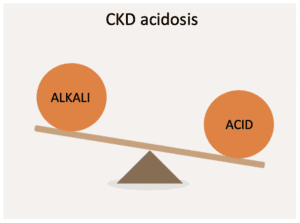Acidosis and chronic kidney disease (CKD)
Chronic kidney disease (CKD) can cause high acid levels in the blood. Doctors call this ‘acidosis’.
Fortunately it usually only affects patients in the more advanced stages of CKD, i.e. CKD4-5. Up until then the acid levels do not need to be measured. After then, in many patients, acid levels should be measured and monitored, using the blood bicarbonate level (the lower the level, the worse the acidosis).
But. Why does CKD cause acidosis? What symptoms does CKD-related acidosis cause? How is it monitored? How is it treated? We will now address these and other questions.
What is acidosis?
Acidosis means having more acid in your blood than is normal. Acidity in the blood is measured using the ‘pH’ scale. Acidosis may also be referred to as having a low pH. There can be lots of causes for this, including CKD.
Why does acidosis happen in CKD?
Acidosis occurs in CKD because the kidneys are damaged and aren’t working properly. This means they can’t remove waste acid in the urine anymore and it builds up in the body. This causes some of the symptoms of CKD.
There are also substances in the body called alkalis. These are usually in balance with acids and the kidney manages this balance. In CKD the kidneys can’t reabsorb alkalis properly, causing more symptoms.
Click here to learn more about the functions of the kidney

So. Tell me 10 facts about CKD acidosis.
1. Metabolic acidosis
Acidosis in CKD is called ‘metabolic acidosis’. It develops when the kidneys cannot remove enough acid in the urine. The kidneys also cannot pull back enough bicarbonate (an alkali) from the urine, to balance the acids. See below for the symptoms this might cause.
2. Bicarbonate levels
Bicarbonate (HCO3-) is an important alkali in the body. It helps maintain the blood’s pH (acidity) at a normal level. In CKD acidosis, blood bicarbonate levels are lower than normal.
Normal bicarbonate in the blood is 22-28 mmol/L. In CKD it is often under 20 mmol/L (mild acidosis). If it is under 18 mmol/L (moderate acidosis), treatment should be considered. Under 16 mmol/L is severe acidosis, and requires treatment.
3. Common complication
Metabolic acidosis is a common complication of later stages of CKD (stage 4-5). This is because kidney function is significantly reduced.
- 30% of patients with CKD stage 4 have acidosis
- 45% of those with CKD5 (on dialysis or with a kidney transplant) have acidosis
Click here to learn more about the stages of CKD.
4. Symptoms
Mild acidosis often has no symptoms.
When acidosis worsens, symptoms such as tiredness, muscle weakness and loss of appetite occur. However, these symptoms can be caused by conditions other than acidosis. This can make it difficult to know their cause in CKD.
Symptoms of severe acidosis include: muscle twitching, extreme weakness, and eventually confusion. This is life-threatening. Acidosis can also worsen the effects of renal bone disease and cause further kidney damage.
5. Renal bone disease
CKD acidosis decreases bone health by releasing calcium from bones. This is called renal bone disease. This happens to help reduce the excess acid in the blood. Over time, this can lead to weakened bones and an increased risk of fractures.
6. Impact on muscle health
CKD acidosis also decreases muscle health. It leads to loss of muscle bulk and weakness.
7. Diagnosis
Diagnosis of CKD acidosis involves a blood test to measure bicarbonate and pH (acidosis). A blood bicarbonate less than 22 mmol/L means you have acidosis.
8. Treatment
The main goal of treating CKD acidosis is to increase blood bicarbonate levels and restore the balance with acid. Treatment options include oral bicarbonate tablets (see below), dietary changes, and managing the CKD. When acidosis is very severe (bicarbonate under 12 mmol/L), dialysis is usually needed.
Changes to the diet include eating more plant-based proteins and a high intake of fruits and vegetables.
9. Sodium bicarbonate
Sodium bicarbonate tablets (0.5-2g two or three times a day) are often prescribed to help raise blood bicarbonate levels. This helps reduce the extra acid in the body.
Sodium bicarbonate tablets [“yes its the same stuff that goes in cakes.” CKDEx Ed]
10. Prognosis
Acidosis can make CKD worse and damage your overall health. Proper management of acidosis can help improve the patient’s quality of life and slow down the progression of kidney damage.
It is important for people with advanced CKD to work with their nephrologist (hospital kidney specialist) to monitor acid and bicarbonate in the blood.
Summary
We have discussed acidosis and chronic kidney disease (CKD). We hope it has been helpful.
Other resource
Functions of kidneys 3: acid-base balance
Last Reviewed on 17 June 2024
